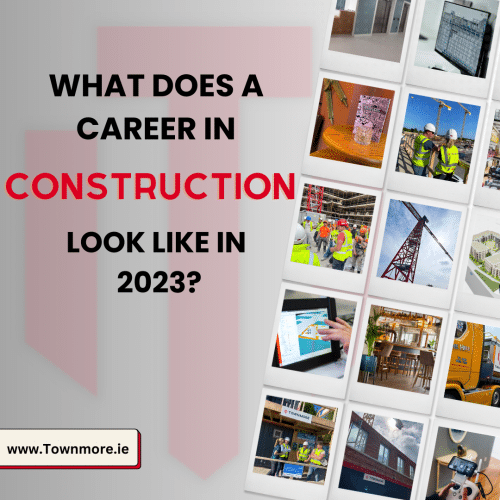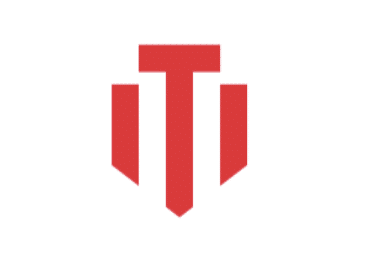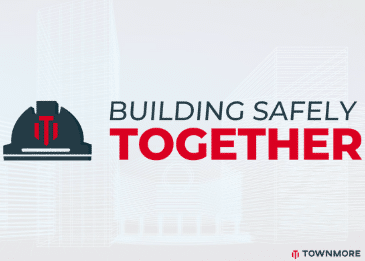- News
- Townmore: What does a career in construction look like in 2023?

Townmore: What does a career in construction look like in 2023?
Earlier this summer we teamed up with Ireland’s first female tower crane operator, Kate Fahey, to raise awareness of what a career in construction really looks like in 2023. It’s no longer just about muddy boots on the ground – although those boots on the ground are critical – there are so many more roles and career opportunities available, from finance, HR and change management, right through to mixed reality (AR/VR/XR), UX/user experience design and a whole host of emerging technologies. Learn more about the #ImInConstruction campaign here: https://townmore.ie/news/townmore-partners-with-kate-fahey-irelands-first-female-tower-crane-operator-to-launch-industry-wide-campaign-promoting-careers-in-construction/ and contact us to get your team of construction experts involved!
Why the #ImInConstruction campaign?
Careers in construction have a certain reputation, but in practice, the work of industry is changing every day. The traditional image of the construction industry – workers in hard hats on a building site – needs to evolve. Advances in technology, digitalisation, and a focus on sustainability have reshaped the sector, opening up innovative roles that combine traditional skillsets with a new tech-driven approach. In 2023, careers in construction are as diverse as they are exciting, marrying the physical and digital worlds in ways that seemed impossible just a few years ago.
The Rise of AI, Data Analytics and UX in Construction
Artificial Intelligence (AI), data analytics, and User Experience (UX) are no longer buzzwords confined to the tech industry. In the construction sector, AI and machine learning specialists use their skills to forecast project outcomes, automate processes, improve safety, and increase overall productivity. Data analysts are interpreting complex construction data and transforming it into actionable insights. UX designers, meanwhile, are revolutionising the construction industry by creating intuitive, user-friendly digital interfaces for construction professionals.
The Evolution of Traditional Construction Roles
While these new roles represent a significant shift, they stand alongside more traditional roles that have also been transformed by the embrace of digitalisation and technological advances.
*Engineers: Advanced software has revolutionised structural engineering, allowing for complex simulations and stress tests that help to optimise building design and anticipate problems before they occur. Engineers are now able to use these tools to improve safety, reduce costs, and deliver more ambitious projects.
*Ground Workers: Ground work, the first physical stage of construction, has also seen substantial changes. New technologies such as GPS and digital mapping tools have greatly improved the precision and speed of site surveys. Ground workers now use advanced machinery equipped with automated features, drastically increasing efficiency and reducing the risk of errors.
*Demolition Experts: The demolition process has become safer, faster and more precise, thanks to technological advancements such as robotic demolition equipment and the use of drones for initial site inspections. This allows demolition experts to perform their roles more effectively, reducing risk and maximising efficiency.
Digital Design and BIM: Embracing the Future of the Built Environment
Perhaps one of the most significant transformations in the construction industry is the rise of digital design and Building Information Modelling (BIM). BIM allows for the creation of detailed 3D models of structures, enabling architects, engineers, and construction professionals to collaborate effectively.
It provides a comprehensive view of a project, highlighting potential issues and inefficiencies before construction begins. This approach reduces project risks, lowers costs, and improves efficiency. With BIM, designs can be tested in a virtual environment, allowing for changes and improvements before physical construction starts.
Sustainability: The Green Shift
Environmental considerations are now at the forefront of construction, with sustainability experts playing a key role. These professionals ensure that projects adhere to environmental regulations, integrate green technologies, and design structures that are energy-efficient and environmentally sound – we all have a role to play in halving carbon reduction by 2030, the target set out under Ireland’s Climate Action Plan.
The construction industry in 2023 presents a compelling blend of traditional and emerging roles. It’s an industry that has not just embraced technology but is at the forefront of its practical application, leading to improved safety, increased efficiency, and a more sustainable future. From AI enthusiasts to data experts, UX designers, engineers, ground workers, and demolition experts, there’s a place in construction for a vast array of talents and skills. By combining the physical and digital realms, the construction sector offers careers that shape not just structures, but the very world in which we live.
Check out the roles currently available with Townmore: https://townmore.ie/careers/



